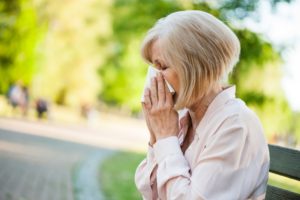 An allergic reaction can send anyone into a frenzy. But can allergens also raise your blood pressure? The answer is somewhat complicated, but in short, is “yes and no.”
An allergic reaction can send anyone into a frenzy. But can allergens also raise your blood pressure? The answer is somewhat complicated, but in short, is “yes and no.”
Allergies do not have a direct effect on blood pressure. A fit of sneezing or another reaction may lead to a temporary increase in blood pressure but is not a long-term contributor. High blood pressure is not an allergic reaction. That said, allergies might indirectly influence blood pressure in a couple of ways.
Advertisement
The first is based on how you treat allergy symptoms. Two classifications of decongestants—pseudoephedrine (Sudafed and Actifed) and phenylephrine (Sudafed PE)—constrict blood vessels in the nose to relieve congestion and improve breathing. But these effects are not localized. The drugs also constrict other blood vessels throughout the body and force the heart to work harder to pump blood.
This, in turn, can lead to higher blood pressure. If blood pressure is a concern, use antihistamines like Benadryl or Claritin, which don’t have the same risks for your heart. You could also look into targeted nasal sprays.
Another way that allergies can influence blood pressure is by making it harder to breathe during sleep. This is especially true for people that may suffer from sleep apnea. If allergies cause you to gasp for air while snoring heavily, there may be an impact on blood pressure. Sleep apnea is closely associated with high blood pressure and can increase the risk of heart attack and stroke.
If you suffer from allergies, it does not have a direct impact on blood pressure, but some of the treatments and symptoms might. The best way to minimize these risks is to avoid decongestants featuring pseudoephedrine and phenylephrine and lower the risk of sleep apnea.
You can reduce the chances of sleep apnea and the cardiovascular risks associated with it by losing weight, eating a healthy diet, increasing activity, and addressing any sleep concerns. Sometimes a visit to the sleep clinic—or listening to your partner’s concerns about your snoring and gasping—will be all you need. A CPAP machine can help drastically reduce the effects of sleep apnea and perhaps treat it completely.
